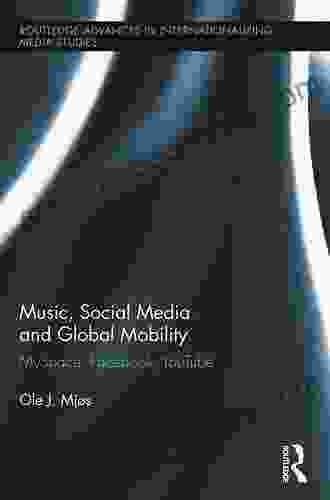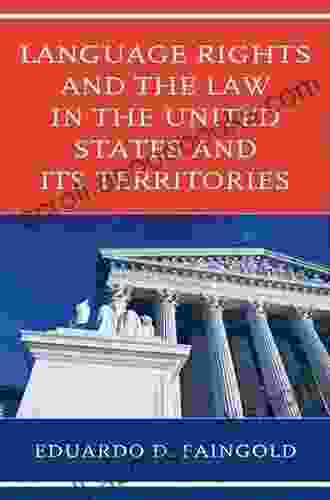Language Rights and the Law in the United States and Its Territories

In the tapestry of American society, language plays a vibrant and multifaceted role. It shapes our thoughts, fosters communication, and connects us to our heritage. However, this linguistic landscape is far from static, and the interplay between language and the law presents a complex array of challenges and opportunities.
4.5 out of 5
| Language | : | English |
| File size | : | 2988 KB |
| Text-to-Speech | : | Enabled |
| Screen Reader | : | Supported |
| Enhanced typesetting | : | Enabled |
| Word Wise | : | Enabled |
| Print length | : | 135 pages |
| X-Ray for textbooks | : | Enabled |
The United States, a nation built upon the foundations of immigration and cultural diversity, is a microcosm of linguistic richness. From the bustling streets of New York City, where a symphony of languages echoes, to the remote villages of Alaska, where indigenous tongues thrive, the linguistic tapestry of America is a vibrant testament to the diversity of its people.
Yet, alongside this linguistic diversity, there exists a complex web of laws and policies that govern language use in various spheres of life. Understanding these laws is crucial for safeguarding the rights of individuals and communities to use and preserve their languages.
The Legal Framework of Language Rights in the United States
The legal framework surrounding language rights in the United States is a patchwork of federal and state laws, court decisions, and administrative regulations. While there is no overarching federal law that explicitly guarantees language rights, several constitutional amendments and statutes provide protection against discrimination based on language.
- The Equal Protection Clause of the Fourteenth Amendment prohibits states from denying any person "within its jurisdiction the equal protection of the laws." This clause has been interpreted to protect against discrimination based on language in certain contexts, such as education and voting.
- Title VII of the Civil Rights Act of 1964 prohibits employers from discriminating against employees on the basis of "national origin," which can include discrimination based on language.
- The Voting Rights Act of 1965 requires states and localities with a significant population of non-English speakers to provide bilingual ballots and other voting materials. This law aims to ensure that language barriers do not prevent individuals from exercising their right to vote.
In addition to these federal laws, several states have enacted their own language rights laws. These laws vary in scope and content, but many provide additional protections for language minorities in areas such as education, employment, and access to government services.
Language Rights in Education
Education is a critical arena where language rights come into play. The ability to learn in one's native language or a language that one understands has a profound impact on educational outcomes. Research has consistently shown that students who receive instruction in their native language perform better academically and have higher graduation rates.
In the United States, the federal government and many states have recognized the importance of language rights in education. Federal law requires schools to provide language assistance to students who are not proficient in English. This assistance can include bilingual education programs, English as a Second Language (ESL) classes, and translated materials.
Despite these legal protections, language rights in education remain a contentious issue. Some argue that bilingual education programs are unnecessary and that all students should be taught in English. Others maintain that bilingual education is essential for ensuring equal access to education for language minority students.
Language Rights in Employment
Language can also play a significant role in the workplace. Employers have a legal obligation to provide a workplace free from discrimination based on language. This includes not only hiring and firing practices but also promotions, job assignments, and working conditions.
In certain industries, such as healthcare and education, employers may be required to provide language assistance to employees who are not proficient in English. This assistance can include interpreters, translated materials, and training programs.
Language discrimination in the workplace can have a devastating impact on workers. It can lead to lost job opportunities, lower wages, and a hostile work environment. However, legal protections exist to safeguard language rights in employment, and individuals who experience discrimination should not hesitate to seek legal recourse.
Language Rights and Access to Government Services
Access to government services is essential for individuals to fully participate in society. This includes access to healthcare, social services, and legal assistance. Language barriers can create significant obstacles to accessing these services, particularly for individuals who are not proficient in English.
Federal law requires state and local governments to provide language assistance to individuals who are not proficient in English. This assistance can include interpreters, translated materials, and bilingual staff. Failure to provide language assistance can violate the Equal Protection Clause of the Fourteenth Amendment.
Ensuring meaningful access to government services for language minorities is crucial for promoting equity and ensuring that all individuals have the opportunity to thrive.
The Importance of Language Rights
Language rights are not simply a matter of legal protection; they are fundamental to the preservation of linguistic diversity and the well-being of individuals and communities. Language is more than just a means of communication; it is an integral part of culture, identity, and heritage.
When language rights are respected, individuals are empowered to fully participate in society, regardless of their language background. They can access education, employment, and government services without facing discrimination or barriers. Moreover, language rights foster a sense of belonging and promote social cohesion.
Conversely, when language rights are violated, individuals are marginalized and their opportunities are diminished. They may experience discrimination, isolation, and difficulty in accessing essential services. In extreme cases, language suppression can lead to cultural genocide.
Language rights are a complex and multifaceted issue in the United States and its territories. The legal framework surrounding language rights is constantly evolving, and there remain significant challenges in ensuring equal access to education, employment, and government services for language minorities.
However, the importance of language rights cannot be overstated. Language is a fundamental aspect of human identity and social interaction. Respecting language rights is not only a legal obligation but also a moral imperative.
By understanding the legal framework surrounding language rights and advocating for their protection, we can create a more inclusive and equitable society that values linguistic diversity and empowers all individuals to thrive.
4.5 out of 5
| Language | : | English |
| File size | : | 2988 KB |
| Text-to-Speech | : | Enabled |
| Screen Reader | : | Supported |
| Enhanced typesetting | : | Enabled |
| Word Wise | : | Enabled |
| Print length | : | 135 pages |
| X-Ray for textbooks | : | Enabled |
Do you want to contribute by writing guest posts on this blog?
Please contact us and send us a resume of previous articles that you have written.
 Book
Book Novel
Novel Page
Page Chapter
Chapter Text
Text Story
Story Genre
Genre Reader
Reader Library
Library Paperback
Paperback E-book
E-book Magazine
Magazine Newspaper
Newspaper Paragraph
Paragraph Sentence
Sentence Bookmark
Bookmark Shelf
Shelf Glossary
Glossary Bibliography
Bibliography Foreword
Foreword Preface
Preface Synopsis
Synopsis Annotation
Annotation Footnote
Footnote Manuscript
Manuscript Scroll
Scroll Codex
Codex Tome
Tome Bestseller
Bestseller Classics
Classics Library card
Library card Narrative
Narrative Biography
Biography Autobiography
Autobiography Memoir
Memoir Reference
Reference Encyclopedia
Encyclopedia Bhurijana Dasa
Bhurijana Dasa Brian Tarcy
Brian Tarcy Tao Yang
Tao Yang Brian Joseph Gilley
Brian Joseph Gilley Lenny Duncan
Lenny Duncan Bob Gendron
Bob Gendron Blake Arthur Peel
Blake Arthur Peel Betty Y Ashbaker
Betty Y Ashbaker Bink Cummings
Bink Cummings M R Graham
M R Graham Brighid O Sullivan
Brighid O Sullivan Bitel Beyette
Bitel Beyette Holly Sheidenberger
Holly Sheidenberger Keri Lake
Keri Lake L J Shen
L J Shen Brad Meltzer
Brad Meltzer Brandon D Lundy
Brandon D Lundy Joanna Baillie
Joanna Baillie Bill O Neill
Bill O Neill Miriam Davidson
Miriam Davidson
Light bulbAdvertise smarter! Our strategic ad space ensures maximum exposure. Reserve your spot today!

 Jay SimmonsImmerse Yourself in the Rhythm of Life with "In the Beat of the Moment, Heart...
Jay SimmonsImmerse Yourself in the Rhythm of Life with "In the Beat of the Moment, Heart...
 David Foster WallaceArt As Way Of Talking For Emergent Bilingual Youth: Empowering Young Voices
David Foster WallaceArt As Way Of Talking For Emergent Bilingual Youth: Empowering Young Voices
 Benjamin StoneUnveil the Profound Transformation of Yellow Woman and the Beauty of the...
Benjamin StoneUnveil the Profound Transformation of Yellow Woman and the Beauty of the...
 Charles BukowskiPoetic Arguments For World Government: A Must-Read for Peace and Progress
Charles BukowskiPoetic Arguments For World Government: A Must-Read for Peace and Progress Jerome PowellFollow ·5.6k
Jerome PowellFollow ·5.6k Jack ButlerFollow ·3.1k
Jack ButlerFollow ·3.1k Brennan BlairFollow ·16.1k
Brennan BlairFollow ·16.1k Max TurnerFollow ·5.6k
Max TurnerFollow ·5.6k Greg CoxFollow ·7.5k
Greg CoxFollow ·7.5k Allen GinsbergFollow ·14.1k
Allen GinsbergFollow ·14.1k Curtis StewartFollow ·15.4k
Curtis StewartFollow ·15.4k Gus HayesFollow ·17.4k
Gus HayesFollow ·17.4k

 Corey Green
Corey GreenHuman Geography: A Concise Introduction by Gilbert...
A Journey into the Dynamic Realm of...

 Julian Powell
Julian PowellTrain Your Mind to Make Great Art a Habit
Do you dream of...

 Matthew Ward
Matthew WardSmall Town Romance: Heart Compass
Escape to Willow Creek, Where...

 Neil Parker
Neil ParkerMusic, Social Media, and Global Mobility: Exploring...
: The Convergence of Music, Media, and...

 Seth Hayes
Seth HayesUnlock the Potential of Potential Theory with Brooke...
Embark on an...
4.5 out of 5
| Language | : | English |
| File size | : | 2988 KB |
| Text-to-Speech | : | Enabled |
| Screen Reader | : | Supported |
| Enhanced typesetting | : | Enabled |
| Word Wise | : | Enabled |
| Print length | : | 135 pages |
| X-Ray for textbooks | : | Enabled |






